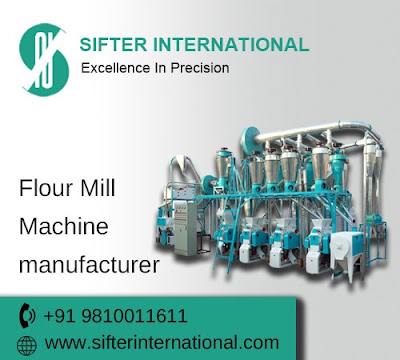In the world of food production, few industries are as fundamental as flour milling. Flour is a staple ingredient in countless recipes, making it a crucial element in the global food supply chain. Behind every bag of flour lies a sophisticated process driven by technology and machinery. In this blog, we delve into the realm of flour mill machine manufacturer, exploring the pivotal role these manufacturers play in shaping the future of milling.
The Evolution of Flour Milling:
Flour milling has come a long way from traditional stone
grinding to the highly automated and efficient processes we see today. Modern
flour mill machines have transformed the industry, enabling higher production
capacities, improved quality control, and cost-effectiveness. The journey of
flour milling machines reflects a continuous pursuit of excellence in
technology and innovation.
Key Features of Advanced Flour Mill Machines:
1. Precision Grinding
Mechanisms:
State-of-the-art flour mill machines utilize precision
grinding mechanisms that ensure consistent and fine flour production. This not
only enhances the quality of the final product but also improves overall efficiency.
2. Automation and
Control Systems:
Automation has become a cornerstone of modern flour milling.
Manufacturers are integrating advanced control systems that monitor and adjust
various parameters in real-time, optimizing the milling process for efficiency
and quality.
3. Energy Efficiency:
Sustainable practices are at the forefront of today's
industrial landscape. Flour mill machine manufacturers are incorporating
energy-efficient technologies to reduce environmental impact and operational
costs.
4. Versatility in
Processing:
Flour mill machines are designed to process a variety of
grains, catering to the diverse needs of consumers. This versatility is crucial
for adapting to changing market demands and ensuring the sustainability of the
milling industry.
The Role of Flour Mill Machine Manufacturers:
1. Innovation and
Research:
Flour
mill machine manufacturer are at the forefront of innovation. Research
and development efforts focus on creating machines that are not only more
efficient but also environmentally friendly and adaptable to emerging trends in
the food industry.
2. Customization for
Client Needs:
Recognizing the diverse requirements of their clients,
manufacturers offer customizable solutions. Whether it's small-scale artisanal
milling or large industrial operations, flour
mill machine manufacturer tailor their products to suit the unique
needs of their customers.
3. Technical Support
and Training:
The relationship between manufacturers and flour mill
operators extends beyond the point of sale. Reputable manufacturers provide
comprehensive technical support and training programs to ensure that their
clients can maximize the potential of their machinery.
4. Quality Assurance:
Consistency in flour quality is a top priority for both
manufacturers and end-users. Flour mill machine manufacturers implement
stringent quality control measures to guarantee that their machines meet the
highest industry standards.
Conclusion:
The flour milling industry owes much of its success to the
continuous innovations driven by flour
mill machine manufacturer. As they strive to create more efficient,
sustainable, and versatile machines, the future of flour milling looks
promising. The collaboration between manufacturers and mill operators is
essential for maintaining the integrity of the industry and meeting the ever-evolving
demands of the global market. In essence, the journey from grain to flour is
not just a process; it's a testament to the ingenuity of those dedicated to
advancing the art and science of milling.

No comments:
Post a Comment